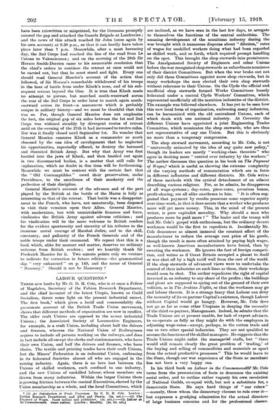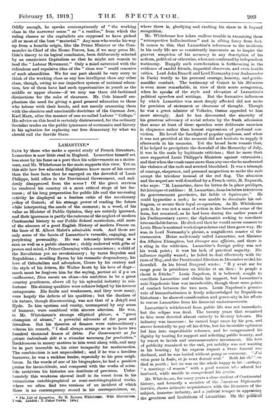LABOUR QUESTIONS.*
D UMB new books by Mr. G. D. H. Cole, who is at once a Fellow of Magdalen, Secretary of the Fabian Research Department, and the chief inventor of the latest Utopia, known as Guild Socialism, throw some light on the present industrial unrest. The first book,' which gives a lucid and commendably dis- passionate account of the British Trade Union movement, shows that different methods of organization are now in conflict. The older craft Unions are opposed to the newer industrial Unions ; the Associated Society of Locomotive Engineers, for example, is a craft Union, including about half the drivers and firemen, whereas the National Union of Railwaymen aspires to include all persons working on the railways, and does in fact include all except the clerks and stationmasters, who have their own Union, and half the drivers and firemen, who have theirs. The textile and printing trades have their craft Unions, but the Miners' Federation is an industrial Union, embracing in its federated Societies almost all who are engaged in the mining industry. Again, there is no love lost between the Unions of skilled workmen, each confined to one industry, and the new Unions of unskilled labour, whose members are drawn from many industries. Within the larger Unions there ingrowing friction between the central Executives, elected by the Union membership as a whole, and the local Committees, which • (I) An IniroduAion lo Trade Unionion. ➢yy O. D. H. Cole. Landon: Abbe Reward) Deputment, and Allen end Umriu. ft. net.1-(51 T.Y. of Wove. Same author and publishera. lea. net.)--(3) ZAeo. is 0M-C:otsontrealte. Mune author. London Headley. Its. ed. esti
are inclined, as we have seen in the last few days, to arrogate to themselves the functions of the central authorities. The amazing development of the munitions industry during the war brought with it numerous disputes about " dilution," rates of wages for unskilled workers doing what had been regarded as skilled work, and so forth, which required prompt handling on the spot. This brought the shop stewards into prominence. The Amalgamated Society of Engineers and other Unions before the war recognized shop stewards as subordinate nominees of their district Committees. But when the war broke out not only did these Committees appoint more shop stewards, but in many workshops the men elected their own shop stewards without reference to their Unions. On the Clyde the official and unofficial shop stewards formed Works Committees loosely federated under a central Clyde Workers' Committee, which represented unofficially all the munition industries of the district. The example was followed elsewhere. It has yet to be seen how this new local form of organization, embracing many industries, can be harmonized with the old centralized Unions, each of which deals with one national industry. At Coventry the different Unions have appointed a joint Engineering Trades Committee, which nominates the shop stewards, who are thus not representative of any one Union. But this is obviously no more than a temporary compromise.
The shop steward movement, according to Mr. Cole, is not " universally animated by the idea of any quite new policy," though its leaders are mostly "working-class theorists" who agree in desiring more " control over industry by the workers." The author discusses this question in his book on The Payment of Wagea,. which is useful as showing the extreme complexity of the varying methods of remuneration which are in force in different industries and different districts. Mr. Cole writes of these methods with the cynical detachment of an atheist describing various religions. For, as he admits, he disapproves of all wage-systems; day-rates, piece-rates, premium bonus, profit-sharing, are all alike anathema to him. " It is often sug- gested that payment by results possesses some superior equity over time-work, in that it does secure that a worker who produces more will get more money. This, in the mind of the present writer, is pure capitalist morality. Why should a man who produces more be paid more ? " The loafer and the tramp will hail Mr. Cole's gospel with enthusiasm, but the ordinary decent workman would be the first to repudiate it. Incidentally Mr. Cole denounces as almost immoral the constant effort of the manufacturer to reduce the average cost price of his goods, though the result is more often attained by paying high wages, as well-known American manufacturers have found, than by sweating the workman. He ignores the fact of foreign competi- tion, and writes as if Great Britain occupied a planet to itself or was shut off by a high tariff wall from the rest of the world. If the shop stewards of advanced views were to undertake the control of their industries on such lines as these, their workshops would soon be shut. The author repudiates the right of capital invested in an industry to any share of the profits ; the buildings and plant are supposed to spring out of the ground of their own volition, as in The Arabian Rights, so that the workmen may go and labour therein. It is a strange fancy that Labour can deny the necessity of its co-partner Capital's existence, though Labour without Capital would go hungry. However, life. Cole 'does not go as far as some other Utopians in denying the necessity of the third co-partner, Management. Indeed, he admits that the Trade Unions are at present unable, for lack of expert advisers, to co-operate aa fully as they might do with the employers in adjusting wage-rates--except, perhaps, in the cotton trade and one or two other special industries. They are not qualified to assume the functions of the skilled managers. He suggests that the Trade Unions might enlist the managerial staffs, but " there would still remain clearly the great problem of trading,' of the buying and selling of commodities and materials as apart from the actual productive processes." This he would leave to the State, though our war experience of the State as merchant has not been a very happy one.
In hie third book on Labour in the Commonweal/01dr. Cole turns from the presentation of facts to denounce the existing social order, and to outline rather vaguely his own revelation of National Guilds, co-equal with, but not a substitute for, a demooratio State. He says hard things of "our rulers" —namely, those whom the democracy chooses to rule over it— but expresses a grudging admiration for the actual directors of large business concerns and for the professional classes.
Oddly enough, he speaks contemptuously of " the working class in the narrower sense " as " a residue," from which the ruling classes or the capitalists are supposed to have picked all or most of the best " material." Any man who works his way up from a humble origin, like the Prime Minister or the Com- mander-in-Chief of the Homo Forces, has, if we may prose Mr. Cole's theory to its logical conclusion, been deliberately selected by an omniscient Capitalism so that he might not remain to lead the " Labour Movement." Only a mind saturated with the ridiculous and repulsive idea of the " class war " could conceive of such absurdities. We for our part should be very sorry to think of the working class as any less intelligent than any other class, though, owing to our imperfect system of national educa- tion, few of them have had such opportunities in youth as the middle or upper classes—if we may use these old-fashioned distinctions for the sake of clearness. Mr. Cole himself em- phasizee the need for giving a good general education to those who labour with their hands, and not merely cramming them with the obsolete and unscientific doctrines of the German Jew, Karl Marx, after the maimer of one so-called Labour " College." His advice on this head is certainly disinterested, for the ordinary Socialist trades on the public ignorance of economics and history in his agitation for replacing our free democracy by what we should call the Servile State.



































 Previous page
Previous page